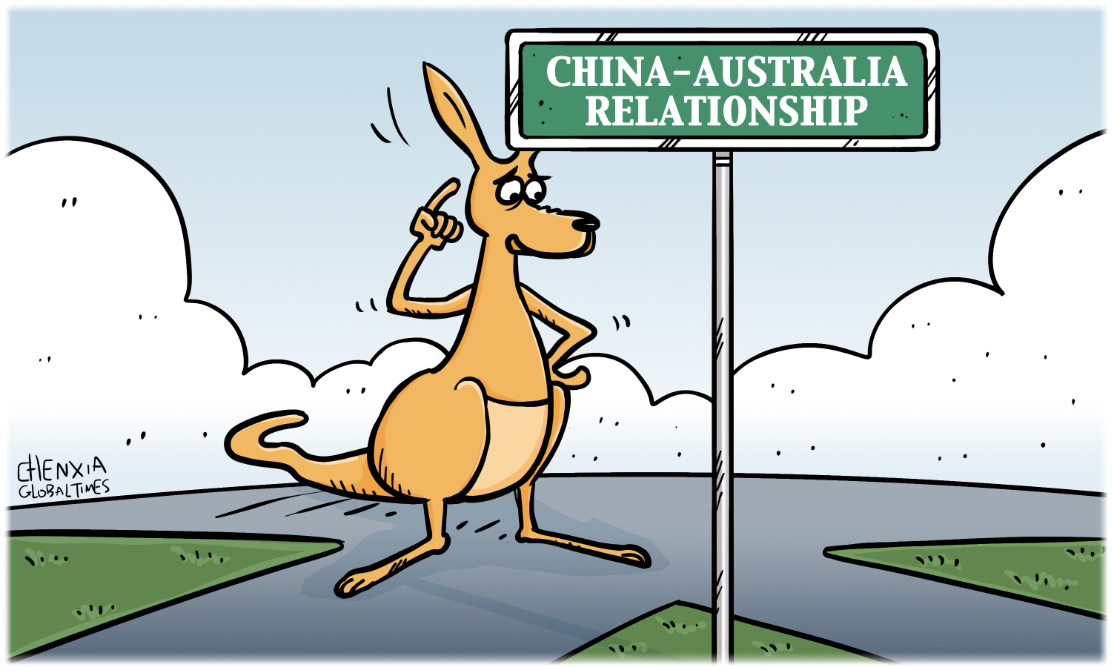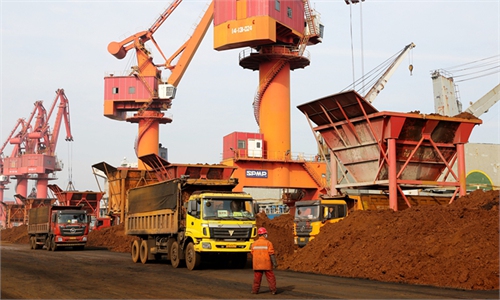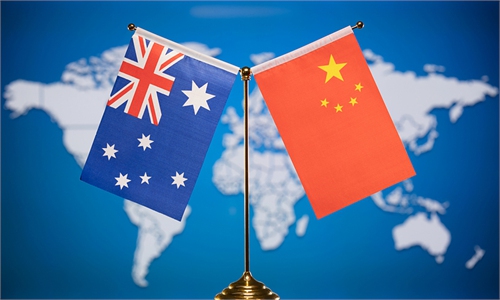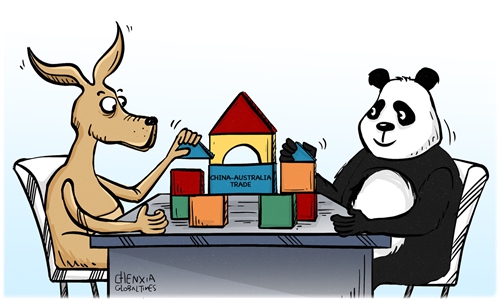GT Exclusive: Australian timber, lobster trade sees fresh signs of potential recovery amid easing ties with China: insiders

Illustration: Chen Xia/GT
Australian timber and lobster, the country's two major exports to China, have seen fresh signs of trade recovery, following the resumption of its coal imports to China in early February, the Global Times learned from several industry insiders familiar with the matter.
While there are growing expectations that bilateral trade will return to normal, experts and insiders said that it will still be decided by several factors, including the willingness of industry players, while urging the Australian side to cherish the hard-earned progress and inject more impetus into the improvement of bilateral relations.
An industry representative told the Global Times on Friday on condition of anonymity that at present, while there has been no imported timber such as logs from Australia to China, things could change soon.
An unofficial meeting between a domestic industry group and Australian authorities will take place next week at the request of Australia and market supply could be discussed, the insider said.
"They [Australian side] have a wish and plan to export wood products to China, and they are currently preparing for it," the person said, without disclosing more details.
Whether and when imports can be resumed depends on many factors, including the willingness of enterprises, the insider said.
In addition to timber, there has also been speculation over the resumption of the lobster trade from Australia.
With Chinese companies gradually restoring confidence and enthusiasm in Australian products amid improved bilateral relations, there are growing expectations of the possible resumption of Australian lobster imports soon, the Global Times learned from two seafood industry insiders.
A purchasing manager with a Beijing-based seafood trading company said that while several large Australian lobster factories are currently not exporting lobsters to the Chinese mainland, one Chinese importer had received an import approval document. "There may be a limited number of imports in the near future," the manager told the Global Times on Friday.
Another event seen by many foreign media as a possible sign of trade resumption is the recent visit by China's Consul General in Perth, Long Dingbin, to the Western Australian lobster exporter Geraldton Fishermen's Co-op on January 11 under invitation.
During the visit, Long said that the relationship between the two countries has shown a stable and positive momentum, and believed that with the joint efforts of all parties, bilateral relations will surely see greater development, according to the official website of the Consulate General.
There have been positive signs that have raised expectations for early resumption of the lobster trade, which could take place this month or next month, Fan Xubing, president of Beijing Seabridge Marketing, a seafood importer, told the Global Times on Friday.
"But it should be pointed out that the production of Australian lobsters is inferior to that of Canadian lobsters, which are now very popular due to the recovery of consumption in the Chinese market, and they are cheaper," Fan said, noting that lobsters from New Zealand, which are similar in quality to Australian ones, are also gaining a greater share of the Chinese market as a good alternative.
China issued import suspension orders on beef and timber from Australia in December 2020 after quality hazards were detected. Several tons of Australian lobsters were also reportedly left stranded at Chinese ports in late 2020 due to clearance delays over standard food safety inspection requirements, according to media reports. Other goods such as coal from Australia were also stagnant.
In response to a number of foreign media reports about the so-called import restrictions on Australian commodities, Chinese Ambassador to Australia Xiao Qian said in early January, using coal trade as an example, that the decision to import Australian coal lies with Chinese companies, not the government.
For many Australian goods ranging from coal to wine, the Chinese market had been its main destination due to the strongest consumption capacity, but soured relations combined with other factors have made many Chinese companies and consumers lose confidence and turn away from Australian goods while looking for other more reliable alternatives to reduce the risks of disruption, a trend that was reflected in trade.
In 2022, bilateral trade stood at $220.91 billion, down 3.9 percent year-on-year, according to data from China's General Administration of Customs. Australian exports to China fell 13.1 percent year-on-year to reach $142.09 billion last year.
While there are growing expectations for improved trade ties with more high-level meetings, a full recovery still requires the Australian side to abandon its Cold War mindset and maintain a pragmatic attitude to serve its own interests rather than act as Washington's pawn, experts said, referring to the recent remarks by the Australian Defense Department regarding the removal of surveillance cameras made by Chinese companies under the pretext of so-called national security.
"This surveillance camera melodrama is for the purpose of instigating a social panic about the so-called 'China threat,' to demonize and stigmatize China, with the ultimate aim of thwarting the ongoing improvement of bilateral relations. The Albanese administration apparently needs to bring the damage [to China-Australia relations] under control instead of allowing it to further erode mutual trust," Chen Hong, president of the Chinese Association of Australian Studies and director of the Australian Studies Centre at East China Normal University, told the Global Times on Friday.
Chen said that since the Labor government took office last May, the freefall in bilateral relations over the past several years has been halted and is expected to be reversed, which is a hard-won success for both Beijing and Canberra. Bilateral economic and trade relations are undergoing a critical restart for the common benefits of both sides, and some forces have been keen on impeding this recovery with their ulterior motives.
Canberra needs to cherish what both sides have jointly achieved, Chen further noted, urging the Australian side to inject more momentum into improving bilateral relations rather than catering to anti-China discords.



